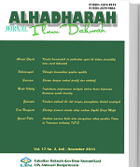PENGARUH KEPERCAYAAN DIRI DAN KEMAMPUAN KOMUNIKASI TERHADAP KEMAMPUAN PUBLIC SPEAKING MAHASISWA PGSD
DOI:
https://doi.org/10.18592/alhadharah.v19i1.3342Keywords:
self-confidence, communication skills, public speaking skillsAbstract
This study aims to determine: (1) The effect of self-confidence on the ability of public speaking; (2) The effect of communication skills on public speaking skills; (3) The effect of self confidence and communication ability on public speaking ability of Elementary School Teacher Education Students 2019, Faculty of Teacher Training and Education, University of Mataram. This research is an ex post facto study using a quantitative data approach. The subjects in this study were students of class 2019, amounting to 345 and then taken as many as 38% of the population of around 131 students. Analysis Methods of data collection using a questionnaire. Test the validity of the instrument using Product Moment correlation and reliability testing using Alpha Cronbach. Data analysis uses descriptive statistical analysis; analysis prerequisite test consisting of normality test, linearity test, and multicollinearity test; and regression analysis consisting of a simple linear regression test and multiple linear regression test. The results showed: (1) There was a positive and significant effect of self- confidence on the public speaking ability. (2) There is a positive and significant influence of communication ability on the public speaking ability. (3) There is a positive and significant influence of self-confidence and communication ability on the public speaking ability.References
Ady Wibowo, I. P. 2010. Memperkuat Kepercayaan Diri Anak Melalui Percakapan Referensial. Jurnal Pendidikan Penabur. 15.Hal 37 – 49.
Arif Widodo, Dyah Indraswati, Deni Sutisna, Nursaptini, S. N. (2020). Identifikasi Bakat Peserta Didik Berkebutuhan Khusus (Pdbk) Di Madrasah Inklusi Kabupaten Lombok. Jurnal Pendidikan Inklusi (JPI), 3(2), 102–116. https://doi.org/http://dx.doi.org/10.26740/inklusi.v3n2.p102-116
Arif Widodo, Dyah Indraswati, A. R. (2020). Analisis Penggunaan Media Gambar Berseri Untuk Meningkatkan Kemampuan Membaca Siswa Disleksia Di Sekolah Dasar. Magistra: Media Pengembangan Ilmu Pendidikan Dasar Dan Keislaman, 11(1), 1–21. https://doi.org/http://dx.doi.org/10.31942/mgs.v11i1.3457.
Bukhori, B. (2016). Kecemasan berbicara di depan umum ditinjau dari kepercayaan diri dan keaktifan dalam organisasi kemahasiswaan. Jurnal Komunikasi Islam, 6(1), 158–186. https://doi.org/10.15642/JKI.2016.6.1.158-186.
David Zarefsky. (2013). Public speaking: Strategies for Success. USA: Pearson. Edisi-7.
Deni Sutisna, Dyah Indraswati, Nursaptini, Setiani Novitasari, M. S. (2020). Penerapan Program Pendidikan Inklusi Di SDN 1 Sangkawana Lombok Tengah. Progres Pendidikan, 1(2), 115–127.
Dyah Indraswati, Arif Widodo, Aisa Nikmah Rahmatih, Mohammad Archi Maulyda, M. E. (2020). Implementasi Sekolah Ramah Anak Dan Keluarga Di Sdn 2 Hegarsari, Sdn Kaligintung, Dan Sdn 1 Sangkawana. JKKP: Jurnal Kesejahteraan Kelaurga Dan Pendidikan, 7(April), 51–62. https://doi.org/: http://doi.org/10.21009/JKKP.071.05
Fatimah, E. 2006. Psikologi Perkembangan. Pustaka Setia: Bandung.
Indraswati, D. (2018). Efektivitas Model Pembelajaran Kooperatif Tipe Numbered Heads Together ( NHT ) Terhadap : Kompetensi Sikap Siswa , Kompetensi. Journal Research and Analysis : Economy, 1(2), 52–58. Retrieved from https://journal.stkipsingkawang.ac.id/index.php/JRAE/article/view/953.
Indraswati, D., Marhayani, D. A., Sutisna, D., & Widodo, A. (2020). Critical Thinking Dan Problem Solving Dalam Pembelajaran Ips Untuk Menjawab Tantangan. Sosial Horizon, 7(1), 12–28. https://doi.org/10.31571/sosial.v7i1.1540.
Najla Amaly, D. I. (2018). Beauty Vlogger sebagai Media Pembentuk Tren Kecantikan di Indonesia. In M. P. Dr. Zainal Pikri, M.Ag., MA. Dr. Hj. Halimatus Sakdiah, S.Ag., M.Si. Armiah, S.IP., M.Si. Najla Amaly, S.Ikom., M.Med.Kom. Dyah Indraswati, S.Pd. (Ed.), The International Seminar “Dakwah, Local Wisdom, and Transnational Islam” (pp. 301–310). Retrieved from http://fdk.uin-antasari.ac.id/index.php/download/proceeding-the-international-seminar-dakwah-local-wisdom-and-transnational-islam/.
Sugiyono. 2018. Metode Penelitian Kuantitatif, Kualitatif, dan R&D. Bandung: Alfabeta
Sutisna, D., Indraswati, D., & Sobri, M. (2019). Keteladanan Guru sebagai Sarana Penerapan Pendidikan Karakter Siswa. Jurnal Pendidikan Dasar Indonesia, 4(2), 29–33. https://doi.org/http://dx.doi.org/10.26737/jpdi.v4i2.1236.
Wahyuni, S. (2014). Hubungan antara Kepercayaan Diri dengan Kecemasan Berbicara di Depan Umum pada Mahasiswa Psikologi. E-Journal Psikologi, 2(1), 50–62.
Widodo, A., Indraswati, D., Erfan, M., Maulyda, M. A., & Rahmatih, A. I. (2020). Profil minat baca mahasiswa baru PGSD Universitas Mataram. Premiere Educandum : Jurnal Pendidikan Dasar Dan Pembelajaran, 10(February), 34–48. https://doi.org/10.25273/pe.v10i1.5968.
Widodo, A., Husniati, H., Indraswati, D., Rahmatih, A. N., & Novitasari, S. (2020). Prestasi belajar mahasiswa PGSD pada mata kuliah pengantar pendidikan ditinjau dari segi minat baca. Jurnal Bidang Pendidikan Dasar, 4(1), 26–36. https://doi.org/https://doi.org/10.21067/jbpd.v4i1.3808.
Widodo, A., & Indraswati, D. (2019). Analisis Konten HOTS dalam Buku Siswa Kelas V Tema 6 “ Panas dan Perpindahannya ” Kurikulum 2013. Madrasah, 12(1), 1–13. https://doi.org/http://dx.doi.org/10.18860/mad.v12i1.7744.
Widodo, A., Indraswati, D., Novitasari, S., Rahmatih, A. N., & Mataram, U. (2020). The Interest Of Learning Local Script Sasambo Of Pgsd Students At University Of Mataram. Primary : Jurnal Pendidikan Guru Sekolah Dasar, 9(3), 288–302. https://doi.org/http://dx.doi.org/10.33578/jpfkip.v9i1.7895.
Widodo, A., Indraswati, D., & Sobri, M. (2019). Analisis Nilai-Nilai Kecakapan Abad 21 Dalam Buku Siswa SD/MI Kelas V Sub Tema 1 Manusia dan Lingkungan. Jurnal Tarbiyah: Jurnal Ilmiah Kependidikan, 8(2), 125–133. https://doi.org/10.18592/tarbiyah.v8i2.3231
Downloads
Published
How to Cite
Issue
Section
License
Authors retain copyright and grant the journal the right of first publication, with the work simultaneously licensed under the Creative Commons Attribution-NonCommercial 4.0 International Public License (CC BY-NC 4.0). This license allows reusers to distribute, remix, adapt, and build upon the material in any medium or format for noncommercial purposes only, provided that proper attribution is given to the original creator.







